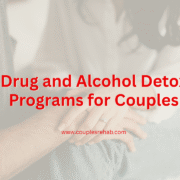Recovering from addiction is a journey filled with challenges, especially when you’re going through it as a couple. Couples who embark on this path together not only need to support each other but also confront the emotional triggers that can complicate the recovery process. At Couples Rehab in Orange County, we understand that identifying and managing these triggers is essential for healing and long-term recovery. In this article, we’ll delve into the dynamics of emotional triggers in recovery, how they impact couples, and the strategies we use at Couples Rehab to foster understanding, resilience, and connection.
What Are Emotional Triggers in Couples Recovery?
In the context of addiction recovery, emotional triggers are specific situations, words, behaviors, or feelings that spark a heightened emotional response, potentially leading to cravings or relapse. For couples, these triggers can stem from shared history, relationship conflicts, or unaddressed traumas. Emotional triggers might involve past arguments, moments of betrayal, or fears of being abandoned, and they can resurface at any point, intensifying stress and jeopardizing recovery.
Understanding emotional triggers is crucial for couples because they often play a significant role in maintaining the cycle of addiction. When left unaddressed, triggers can lead to relapse or strain the relationship, making it difficult for both partners to progress in their recovery journey. Couples Rehab in Orange County prioritizes a comprehensive approach to identifying and managing these triggers to build a strong foundation for a healthy, sober relationship.
Why Emotional Triggers Matter in Recovery
Emotional triggers can disrupt recovery by igniting feelings and memories associated with past substance use, pain, or negative relationship dynamics. When these triggers go unmanaged, they create cycles of conflict, stress, and cravings, making it difficult for couples to focus on healing. Here are some common emotional triggers couples may experience:
- Past Arguments or Misunderstandings: Reminders of unresolved conflicts can cause emotional reactions that undermine trust and fuel tension.
- Feelings of Guilt or Shame: Recovery often brings up memories of hurtful actions during addiction, leading to guilt and shame that may drive individuals back to substance use.
- Stressful Situations: Financial, career, or family pressures can add stress, increasing vulnerability to relapse.
- Fear of Relapse: Partners may fear that their loved one will relapse, creating anxiety and strain within the relationship.
Addressing these emotional triggers is essential for maintaining sobriety and strengthening the relationship. At Couples Rehab, we provide tools to recognize and manage these triggers, empowering couples to navigate recovery together.
Identifying Personal and Shared Emotional Triggers
1. Personal Emotional Triggers
Personal triggers are unique to each individual, shaped by past experiences, trauma, or specific vulnerabilities. For example, one partner may feel triggered by a certain phrase or behavior that recalls painful memories from their childhood. Recognizing and understanding these personal triggers helps each partner become more self-aware and less reactive.
2. Shared Emotional Triggers
Shared triggers arise from experiences or events that both partners have gone through together, often during the addiction period. For example, couples might have memories associated with substance use, arguments, or financial difficulties. These shared triggers require both partners to acknowledge their role in the recovery process and commit to healing together.
At Couples Rehab in Orange County, we help couples distinguish between personal and shared triggers, providing strategies for each type to ensure a well-rounded approach to emotional healing.
The Role of Therapy in Addressing Emotional Triggers
Therapy is a powerful tool for exploring and managing emotional triggers. Couples Rehab offers a variety of therapeutic approaches tailored to help couples understand and overcome their triggers. Here are some of the key methods we use:
Cognitive-Behavioral Therapy (CBT)
Cognitive-Behavioral Therapy is a proven method for helping individuals understand the link between thoughts, emotions, and behaviors. CBT teaches couples how to identify irrational thoughts and replace them with healthier patterns, reducing the emotional impact of triggers. By focusing on positive thinking and constructive communication, couples can break the cycle of reactive behavior and build a supportive foundation for recovery.
Mindfulness-Based Therapy
Mindfulness therapy encourages couples to live in the present moment and respond to situations calmly rather than react impulsively. By practicing mindfulness, individuals learn to recognize triggers without feeling overwhelmed by them. At Couples Rehab, we integrate mindfulness techniques to help couples process difficult emotions and reduce stress.
Trauma-Informed Therapy
Many emotional triggers stem from unresolved trauma. Trauma-informed therapy focuses on helping couples process past traumas in a safe environment. By understanding how trauma has shaped their responses, couples can work together to build resilience, avoid relapse, and foster a more stable relationship.
Couples Counseling
Couples counseling is at the heart of recovery at Couples Rehab in Orange County. In this safe space, partners can openly communicate their fears, emotions, and challenges. By addressing these issues together, couples build trust, empathy, and understanding, which are essential for identifying and overcoming triggers.
How Couples Rehab in Orange County Helps Couples Manage Emotional Triggers
Education on Emotional Triggers and Recovery
Education is key to successful recovery. At Couples Rehab, we emphasize the importance of understanding emotional triggers and how they can affect sobriety. Our team provides educational sessions that help couples recognize their unique triggers, offering practical tools to manage them effectively.
Individualized Treatment Plans
Every couple’s journey is unique, which is why Couples Rehab offers personalized treatment plans that cater to the specific needs of each partner. Whether it’s managing stress, addressing trauma, or building healthier communication patterns, our treatment plans are designed to provide tailored support for lasting recovery.
Communication Skills Training
Poor communication is often a root cause of misunderstandings and conflict, which can trigger negative emotional responses. Couples Rehab provides communication training to help partners express their feelings and needs in a way that fosters understanding and empathy. Through active listening, respectful dialogue, and conflict resolution, couples can develop the skills necessary to handle emotional triggers calmly and constructively.
Healthy Coping Mechanisms
Learning healthy coping mechanisms is crucial in the face of emotional triggers. Our team at Couples Rehab guides couples in developing positive coping strategies, such as journaling, physical exercise, creative activities, and relaxation techniques. These practices help individuals manage their emotional responses without resorting to harmful behaviors.

Practical Strategies for Couples to Cope with Emotional Triggers
In addition to the support and therapy offered at Couples Rehab, couples can adopt various strategies to manage their emotional triggers effectively:
1. Practice Self-Reflection
Encouraging self-reflection is key to understanding the origins of emotional triggers. Both partners should regularly take time to reflect on their feelings, reactions, and underlying concerns. Journaling can be a helpful way to process these thoughts.
2. Establish Boundaries
Boundaries help protect each partner’s emotional space, reducing the chance of reactive responses. Couples should work together to establish boundaries that respect each person’s needs and emotional limits, providing a healthier structure for communication and conflict resolution.
3. Use “I” Statements
When discussing sensitive topics, using “I” statements (e.g., “I feel…”) rather than accusatory language helps reduce defensiveness. This approach allows each partner to express their emotions without placing blame, making it easier to address and overcome triggers.
4. Take Timeouts During Conflict
When a conversation becomes heated or triggering, it’s okay to take a timeout. Stepping back gives both partners time to cool down and process their emotions, preventing escalation. Couples Rehab in Orange County teaches techniques for taking constructive breaks and returning to conversations in a calm manner.
5. Celebrate Progress
Acknowledge and celebrate the progress you’ve made together, no matter how small. Recognizing achievements strengthens the bond between partners and reinforces a sense of teamwork and resilience in the face of challenges.
The Long-Term Benefits of Addressing Emotional Triggers
When couples address and manage their emotional triggers, they not only enhance their chances of long-term sobriety but also strengthen their relationship. A relationship that can withstand the emotional challenges of recovery is one built on trust, mutual respect, and understanding. By working through their triggers, couples can:
- Improve Emotional Regulation: Learning to manage triggers helps individuals regulate their emotions, reducing the frequency and intensity of negative reactions.
- Strengthen Relationship Bonds: Addressing triggers fosters empathy and understanding, which strengthens the relationship and makes it more resilient.
- Increase Resilience in Recovery: As couples become more adept at handling their triggers, they build resilience, which is essential for overcoming future challenges without reverting to harmful behaviors.
Frequently Asked Questions About Emotional Triggers in Couples Recovery
1. What are emotional triggers in couples recovery?
Emotional triggers are specific situations, memories, or feelings that evoke strong emotional responses, often linked to past experiences or unresolved issues. In couples recovery, these triggers can lead to tension, conflict, or even relapse if not managed effectively.
2. Why is it important to address emotional triggers in recovery?
Addressing emotional triggers is essential because they can undermine sobriety and strain relationships. By identifying and managing these triggers, couples create a healthier environment that supports long-term recovery and relationship stability.
3. How does Couples Rehab in Orange County help couples with emotional triggers?
At Couples Rehab in Orange County, we offer specialized therapy, including Cognitive-Behavioral Therapy (CBT), trauma-informed therapy, and mindfulness techniques to help couples recognize and manage their emotional triggers in a supportive environment.
4. Can emotional triggers lead to relapse?
Yes, emotional triggers can increase stress and cravings, making individuals more vulnerable to relapse. Recognizing and managing these triggers is crucial for sustaining recovery and avoiding setbacks.
5. What types of therapy are most effective for managing emotional triggers?
Therapies like Cognitive-Behavioral Therapy (CBT), mindfulness-based therapy, and trauma-informed therapy are highly effective in helping individuals understand and manage emotional triggers. Couples Rehab integrates these approaches into personalized treatment plans.
6. How can couples identify their emotional triggers?
Couples can identify their emotional triggers through self-reflection, open communication, and therapy. Couples Rehab provides tools and guidance to help couples recognize both personal and shared triggers, making it easier to address them together.
7. What are shared emotional triggers?
Shared emotional triggers are triggers that arise from experiences or memories both partners went through together, often related to past conflicts or challenges during addiction. Couples Rehab helps couples address these shared triggers to reduce stress and strengthen their relationship.
8. How does mindfulness help with emotional triggers?
Mindfulness encourages individuals to stay present and respond calmly rather than react impulsively. Practicing mindfulness allows couples to observe their emotional reactions and manage triggers without feeling overwhelmed, which supports sobriety and emotional balance.
9. How does Couples Rehab address communication issues related to emotional triggers?
Couples Rehab offers communication skills training that teaches partners to express their feelings respectfully, listen actively, and resolve conflicts constructively. This training helps couples handle emotional triggers more effectively.
10. What long-term benefits can couples expect from managing emotional triggers?
By managing emotional triggers, couples can improve emotional regulation, strengthen their relationship bonds, and build resilience. These benefits make it easier to maintain sobriety, reduce conflict, and foster a healthy, supportive relationship.
The Path to Lasting Healing Together
Understanding and managing emotional triggers is a critical aspect of couples’ recovery. At Couples Rehab in Orange County, we provide comprehensive support to help couples navigate this process with compassion and professionalism. Our therapeutic approaches, individualized treatment plans, and practical tools empower couples to face their emotional triggers together, building a foundation for lasting sobriety and a stronger relationship.
Embarking on this journey is not easy, but with the right guidance and commitment, couples can overcome their triggers and embrace a healthier, happier future together. If you and your partner are ready to take the next step in your recovery, reach out to Couples Rehab in Orange County today. Our team is here to support you every step of the way, helping you turn challenges into opportunities for growth and connection.









